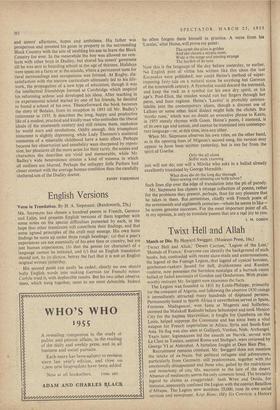English Versions
Verse in Translation. By H. A. Siepmann. (Batchworth, 25s.) MR. SIEPMANN has chosen a hundred poems in French, German , and Latin, and presents English versions of them together with some notes on the special difficulties presented by each, in the , hope that other translators will contribute their findings, and that some agreed principles of the craft may emerge. His own basic findings he sums up under three rough headings: (a) that a poet's experiences are not essentially of his own time or.country, but are just human experiences, (b) that the genius (or character) of a language cannot be imitated, and (c) that an English translation should not, by its diction, betray the fact that it is not an English original written yesterday.
His second point can easily be ceded; clearly no one should bully English words into making German (or French) noises Carlyle tried it, with deplorable results. But his two other observa- tions, which hang together, seem to me most debatable. Indeed.
he often forgets them himself in practice. A verse from his 'Lorelei,' after Heine, will prove my point : The comb she plies is golden And she chants a mystic rune;
Wide is the range and passing strange The burden of its tune.
Now this is the .language of the day before yesterday, or earlier. No English poet of virtue has written like this since the last Keepsakes. were published; nor could Heine's method. of super- imposing fairy-tae on a natural scene be anything but German
of the nineteenth century. A Symbolist would discard the mermaid, and keep the rock as a symbol for his own dry spirit, or his age's. Post-Eliot, the maiden would run her fingers through her perm, and hum ragtime. Heine's 'Lorelei' is probably untrans- latable into the contemporary idiom, though a discreet use of Lallans or some other local dialect might hide the clichés. But
'mystic rune,' which was no doubt an evocative phrase to Keats, in 1955 merely rhymes with Goon. Heine's poem, I contend, is
of its own age and nation, and cannot be translated into contempo- rary language—or, at this time, into any other.
When Mr. Siepmann observes his own rules, on the other hand, as in the opening lines of Mignon's second song, his version may appear to have been .written yesterday, but is too far from the spirit of Goethe. Only the all alone Suffer such yearning
just will not do; nor will a Morike who asks in a ballad already excellently translated by George Meredith:
What does she do the long day through Since sewing and spinning are both taboo?
Such lines slip over the edge of translation into the pit of parody. Mr. Siepmann has chosen a strange collection of poems, rather 'for the problems they present, perhaps, than for any pleasure that he takes in them. But .sometimes, chiefly with French poets of the seventeenth and eighteenth centuries—whom he seems to like—
he scores genuine successes. For the most important point of all, in my opinion, is only to translate poems that are a real joy to you.
J. M. COHEN


































 Previous page
Previous page